THE STORY OF "B.-P."
Lord Baden-Powell of Gilwell 1857-1941
Founder of the Boy Scout Movement
Chief Scout
of the World
If you want to understand Scouting completely, you must know something about the man who
founded the Boy Scout Movement, one of the most real "boy-men" who has ever lived-Lord Baden-Powell of Gilwell, Chief Scout
of the World, affectionately known to all Scouts as "B.-P."
Robert Stephenson Smyth Baden-Powell was born in London, England, on February 22, 1857.
His father was the Reverend Baden Powell, Professor at Oxford. His mother was the daughter of Admiral W. H. Smyth. His great-grandfather,
Joseph Brewer Smyth, was born in America but joined the British forces during the American Revolution and eventually settled
in England. Baden-Powell was thus the descendant of a minister on one side, and of an adventurous colonist of the New World
on the other.
B.-P. as a Boy
His father died when Robert was about three years old, leaving his mother with seven children
under fourteen years of age. There were often hard times for the large family, but the mutual love of the mother for her children
and of the children for their mother always carried them through. Robert lived a glorious outdoor life with his four brothers,
hiking and camping with them in many parts of England.
In 1870 B.-P. gained a scholarship to Charterhouse School, which shortly after his arrival
moved from London to Godalming, Surrey in the heart of the country. He was not an especially outstanding scholar-but he was
one of the liveliest. He was always in the thick of it when something was going on in the schoolyard, and soon became known
for his ability as a goal-keeper in the Charterhouse soccer team. His dramatic abilities were highly appreciated by his fellow
students. Whenever called upon, he would put on a performance that would have the whole school in fits of laughter.
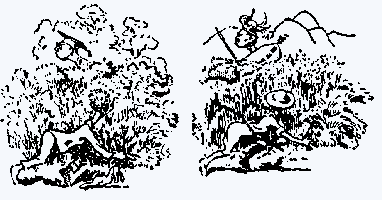
He was also musically inclined, and his gift for sketching later made it possible for
him to illustrate his own writings.
B.-P. in India
At 19, B.-P. passed the Army examination and immediately accepted a chance to go to India
as a sub-lieutenant, to join the 13th Hussars, the regiment which had formed the right of the cavalry line in the famous "Charge
of the Light Brigade" in the Crimean War.
Besides performing excellent military service-he was a Captain at the age of twenty-six-he
won the most desired sports trophy in all India-that for "pig-sticking", wild boar hunting on horseback with a short lance
as the only weapon. You will realize how dangerous this sport is when you know that the wild boar is often spoken of as "the
only animal that dares drink at the same water hole with a tiger".
Fighting in Africa
In 1887 we find B.-P. in Africa, taking part in the campaigns against the Zulus, and later
against the tribes of Ashanti and the Matabele warriors. The tribesmen respected him so much that they gave him the the name
of "Impeesa", the "wolf-that-never-sleeps", because of his courage, his scouting skills and his amazing tracking abilities.
Baden-Powell's advancement in rank was almost automatic, so regularly did it occur-until
suddenly he stepped into fame.
It was the year 1899, and B.-P. had risen to Colonel.
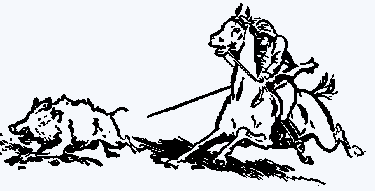
Trouble was brewing in South Africa. The relations between the British and the government
of the Transvaal republic had reached the breaking point. Baden-Powell was directed to raise two battalions of mounted rifles
and proceed to Mafeking, a town in the heart of South Africa. "Who holds Mafeking, holds the reins of South Africa" was a
popular belief which proved to be true.
The Siege of Mafeking
War came, and for 217 days-from October 11, 1899-B.-P. held Mafeking in a siege against
overwhelming numbers of the enemy, until relief forces finally fought their way to his help on the seventeenth day of May,
1900.
Great Britain had been holding its breath through these long months. When finally the
news came: "Mafeking has been relieved", it went mad with joy. Look up "Mafeking" in your English dictionary, and you will
find next to it a word created on that wild day from the name of the African town: "maffick"-meaning "riot-like celebration".
B.-P., now raised to the rank of Major-General, found himself a hero in the eyes of his
countrymen.
Scouting is Born
It was as a hero of men and boys that he returned to England from South Africa in 1901,
to be showered with honours and to discover, to his amazement, that his personal popularity had given popularity to his book
for army men-Aids to Scouting. It was being used as a textbook in boys' schools. B.-P. saw a great challenge in this. He realized
that here was his

opportunity to help the boys of his country to grow into strong manhood. If a book for
men on scouting practices could appeal to boys and inspire them, how much more would a book written for boys themselves! He
set to work adapting his experiences in India, and in Africa and many other parts of the world. He gathered a special library
of books and read of the training of boys through all ages-from the Spartan boys, the ancient British, the Red Indians, to
our own day. Slowly and carefully B.-P. developed the Scouting idea. He wanted to be sure that it would work, so in the summer
of 1907 he took a group of twenty boys with him to Brownsea Island In Poole Harbour for the first Boy Scout camp the world
had ever seen. The camp was a great success.
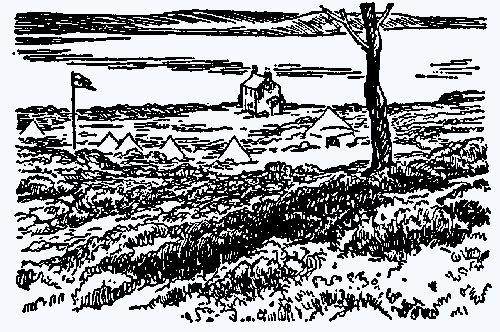
"Scouting for Boys"
And then, in the early months of 1908, he brought out in six fortnightly parts, illustrated
by himself, his handbook for training, Scouting for Boys-without dreaming that this book would set in motion a Movement which
was to affect the boyhood of the entire world.
Scouting for Boys had hardly started to appear in the book shops before Scout Patrols
and Troops began to spring up-not just in England, but in numerous other countries.
B.-P.'s Second Life
The Movement grew and grew and had in 1910 reached such proportions that B.-P. realized
that Scouting was to be his life job. He had the vision and faith to recognize that he could do more for his country by training
the rising generation to be good citizens than by training a few men for possible future fighting.
And so he resigned from the army where he had become a Lieutenant-General and embarked
upon his "second life", as he called it-his life of service to the world through Scouting.
He reaped his reward in the growth of the Scout Movement and in the love and respect of
boys around the globe.
World Brotherhood
In 1912 he set out on a trip around the world to meet Scouts in many countries. This was
the earliest beginning of Scouting as a World Brotherhood. World War I came and interrupted this work for a while, but with
the end of hostilities it was resumed, and in 1920 Scouts from all parts of the world met in London for the first international
Scout gathering-the first World Jamboree.
On the last night of this Jamboree, on August 7, B.-P. was proclaimed "Chief Scout of
the World" by the cheering crowd of boys.
The Scout Movement continued its growth. The day it reached its twenty-first birthday
and thus became "of age", it had mounted
to more than two million members in practically all civilized countries of the earth.
On that occasion, B.-P. was honoured by King George V, by being made a baron under the name of Lord Baden-Powell of Gilwell
. . . Yet, to every Scout he will always remain: "B.-P.", Chief Scout of the World.
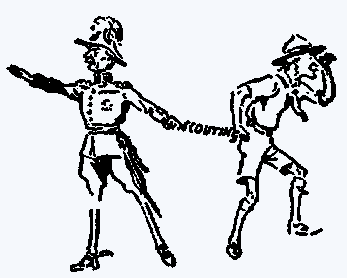
The original World Jamboree was followed by others-in 1924 in Denmark, 1929 in England,
1933 in Hungary, 1937 in Holland. At each of these Jamborees, Baden-Powell was the main figure, greeted tumultuously by "his"
boys wherever he went.
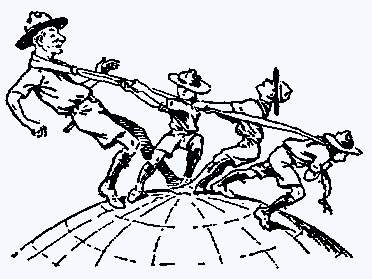
But the Jamborees were only a part of the effort for a World Brotherhood of Scouting.
B.-P. travelled extensively in the interest of Scouting, he kept up a correspondence with Scout leaders in numerous countries
and continued to write on Scouting subjects, illustrating his articles and books with his own sketches.
B.-P.'s Last Years
When finally, after reaching the age of eighty, his strength began to wane, he returned
to his beloved Africa with his wife, Lady Baden-Powell, who had been his enthusiastic helper in all his efforts and who herself
was World Chief Guide-a Movement also started by Baden-Powell.
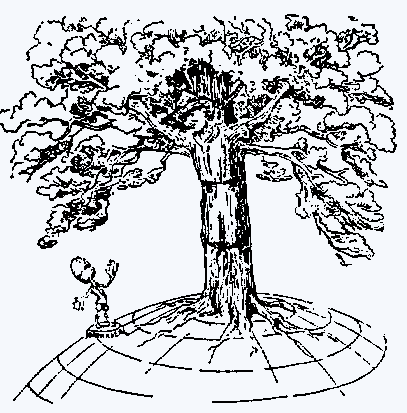
They settled in Kenya, in a peaceful spot, with a glorious view across miles of forest
towards snow-covered Mount Kenya.
There B.-P. died on January 8th, 1941-a little more than a month before his eighty-fourth
birthday.

